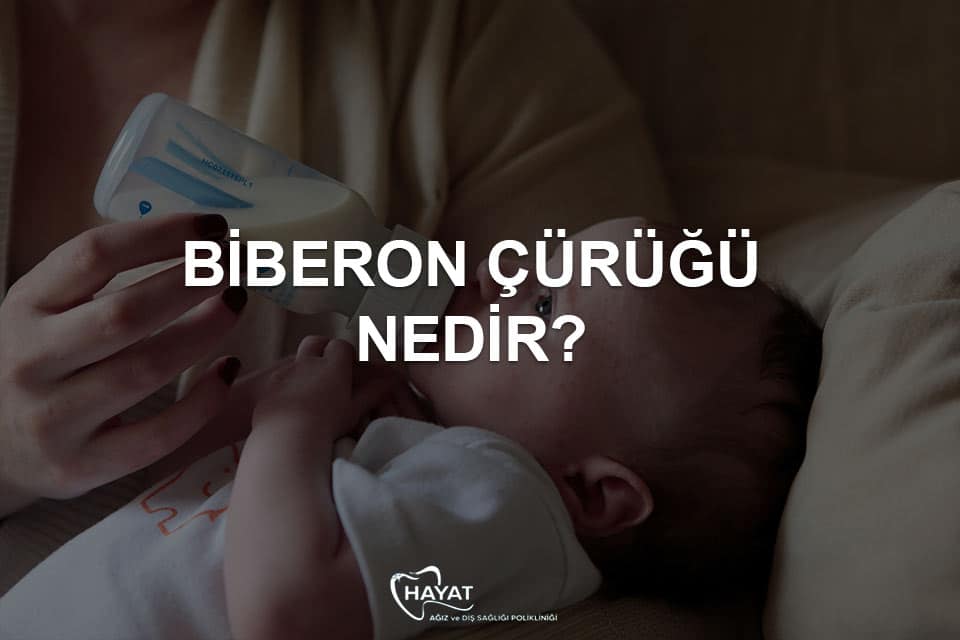

Baby bottle tooth decay is a type of cavity that starts in the upper front baby teeth of infants and spreads quickly, resulting from bottle use or breastfeeding. It is caused by the lactose in breast milk. Baby teeth are always more sensitive than other teeth and decay more easily. These cavities lead to both an aesthetically unpleasant appearance and dental problems that may arise in later years.
Baby bottle tooth decay in infants particularly starts from the 6th month. From this period on, parents, when filling bottles with milk, add sugary foods such as formulas containing sugar, honey, or molasses. These sugary foods cause tooth decay. Additionally, milk or formula given in a bottle before bedtime forms a layer on the teeth throughout the night. If this layer is not cleaned, cavities can form on the front teeth.
It is impossible for young children to diagnose baby bottle tooth decay themselves. Parents can understand the problem by observing certain conditions in the teeth. However, the initial symptoms may not be very clear. Because the first signs are not recognized, these cavities usually manifest themselves when they progress, causing severe pain and fractures in the teeth.
To solve these problems seen in infancy and childhood, it is extremely important to pay attention to dental care and oral health from an early age and to ensure that preventive treatments for decay are carried out. Some of the symptoms of baby bottle tooth decay are as follows:
Parents who see these symptoms should definitely take their babies to a reliable dentist.
Some parents do not take these cavities seriously because baby teeth are temporary. However, this is a very wrong perception. In babies, teeth are very important for speaking, chewing, and smiling. They also act as placeholders for the adult teeth that will come in later. Untreated teeth can cause cosmetic problems like crooked teeth in the future. Additionally, negative situations like pain and infection can occur. In more serious cases, even tooth extraction may be seen. To avoid such negative situations, detailed research should be done, and a solution should be found by consulting a skilled dental specialist.
To prevent baby bottle tooth decay, parents must first seek help from experts. A treatment roadmap can be drawn up according to the expert’s recommendations. Early diagnosis of the problem should be made, especially at or before 1 year of age. Apart from this, effective measures like the following can be taken:
Effective measures like these will provide significant protection for babies and children in solving many problems related to oral health. Otherwise, it is inevitable to face irreversible problems in the future.
One of the most frequently asked questions about the problem of baby bottle tooth decay, seen in most babies, is “Is there a treatment for baby bottle tooth decay?”. Of course, baby bottle cavities can be treated. Today, very advanced treatment methods are applied for this problem. However, in cases of excessively advanced decay, treatments also become very difficult. The important point here, as with any health problem, is early diagnosis.
If cavities that are noticed early are treated immediately, there is a high chance of getting rid of the baby bottle tooth decay problem. In delayed cases, after a few treatments, the only way to get rid of it may be through tooth extraction. However, treatments for baby bottle tooth decay are generally low in pain and discomfort. Therefore, parents do not need to worry.
Another important point regarding the treatment of baby bottle tooth decay is not to interrupt the treatments. Unfortunately, in teeth that are not treated, extraction is performed. There are no medical interventions like surgery in the treatment process. During the decay treatment, parents should not give their children sugary foods such as honey, molasses, formula, etc. Otherwise, the treatment will not respond positively.
Another question that comes to mind about the treatment of baby bottle tooth decay is “How is the treatment of very young babies carried out?”. These treatments for young babies are performed while the baby is in the parent’s lap. It is possible to completely clean the cavities with a few short sessions performed in this way.
Can Baby Bottle Tooth Decay Be Prevented by Breastfeeding?
Many dentists recommend breastfeeding over bottle-feeding for the general oral and dental health of babies. Therefore, yes, feeding by breastfeeding causes fewer cavities than feeding with a bottle.
Can Cavities in Baby Teeth Be Treated?
There are treatment methods for cavities in baby teeth. These methods are generally painless and without discomfort. However, in cases of advanced baby tooth decay, different treatments are applied. These can go as far as tooth extraction.